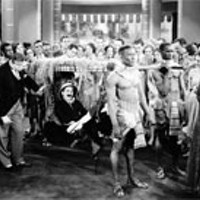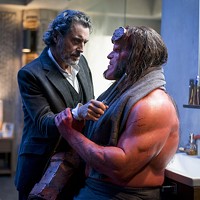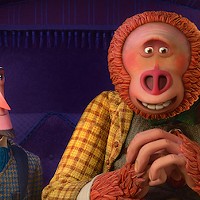

Certainly, the playful sensibilities of this French writer-director seemed right at home in the quirky romantic comedy Amelie. Alien: Resurrection doesn't count one way or the other -- just another example of a highly regarded foreign director trying to crack the Hollywood big time and getting chewed up and spit out instead. But in his three other major features to date, Jeunet turned to topics that, in most hands, would seem grotesque choices around which to spin fanciful tales full of charm, humor and lovable characters. Fortunately, all three work.
Delicatessen, whose stateside release was orchestrated by Terry Gilliam, dealt with cannibalism, while The City of Lost Children, which handed Ron Perlman a heroic leading role long before Hellboy came along, centered around a series of child kidnappings. And now Jeunet beings us A Very Long Engagement, a movie that bills itself as a love story even though it's as much about the horrors of World War I.
The ad material wants us to believe that Engagement is cut from the same cloth as pictures like The English Patient and Reds, movies that place grand romances against the backdrop of wars and revolutions and social upheaval. But Jeunet's movie is a different kind of epic, with a light touch and an offbeat attitude that strip the story of much of its gravitas and instead replace it with a freewheeling flippancy. Engagement isn't as overtly funny as Jeunet's previous films, but its comic quota is still there, resting behind its players' character quirks or within the tight choreography of several of the more elaborate set pieces. The result is a real curio: often delightful, often tragic, yet never as penetrating as one might expect. It's easy to see why some critics would dismiss this as a coldly calculating film, yet it's difficult to grasp why they don't give more props to Jeunet's masterful assemblage of so many disparate elements into a cohesive whole.
Initially recalling Stanley Kubrick's Paths of Glory both in its indictment of war and its disgust at the officers who view their soldiers as expendable objects, Engagement kicks off by detailing how five French soldiers who purposely wounded themselves in order to avoid further combat duty (actually, one self-inflicted injury was an accident, though no one believes it) have instead been corralled and thrown into the no-man's-land between the French and German trenches. It's a sadistic form of execution; as one witness puts it, the cold and the hunger will kill the quintet if the Germans don't.
But despite overwhelming evidence that all five men perished on that battlefield, young Mathilde (Amelie's Audrey Tautou), a 20-year-old girl whose body has been crippled by polio but whose mind is always racing ahead (as she puts it, "I'm lame, not dim"), is convinced that at least one prisoner survived the ordeal: her boyish lover Manech (Gaspard Ulliel). Insisting that she would have "felt" Manech's death, she figures that he must still be alive. So she sets off across the post-war terrain in an effort to track him down, displaying sleuthing skills that would gain the approval of Hercule Poirot or Ellery Queen.
What follows isn't necessarily complicated, but it is dense in terms of the amount of material being presented: This film seems to boast as many characters in its 133-minutes as TV's Dallas did during its entire 13-season stretch. And woe to the viewer who loses track of any of them. Yet even if the resolution proves to be underwhelming, the pleasures along the way -- most in the form of surprising plot twists, familiar faces popping up in unexpected places (including one American Oscar winner who's fluent in French), and Jeunet's gorgeous compositions -- should leave most filmgoers satisfied. A Very Long Engagement shows that while war may be hell, war movies can be swell.
Decency is an increasingly rare commodity in American cinema. I'm not referring to the larger-than-life strain of honor and uprightness: The multiplexes are full of movies featuring superheroes and gladiators and kick-ass cops. Nor am I talking about the bogus morality found in such pieces of hypocrisy as Christmas With the Kranks and Little Black Book, films in which characters are allowed to behave outrageously until the final five minutes, at which point they suddenly realize the error of their ways and absorb phony life lessons in the blink of an eye. No, this morality is the type we can all aspire to, the everyday brand that affects ordinary people trying to make the right choices when it comes to their families, their business associates and their own inner moral compasses.
In Good Company, the new film written and directed by Paul Weitz (About a Boy), works as well as it does because its central character, Dan Foreman, is a paragon of uncompromised ideals, and because Dennis Quaid plays him so perfectly that we can't help but line up behind this guy and cheer him on. Dan, the savvy ad manager for a sports magazine, enjoys a camaraderie with his customers that smacks more of friendship than a business arrangement. He deeply loves his wife Ann (Marg Helgenberger) and his teenage daughters Alex (Scarlett Johansson) and Jana (Zena Grey), and he's excited when he learns that Ann is again pregnant. He's popular with his coworkers, especially the ones who flourished under his mentorship. Like all of us, Dan worries about financial matters (small wonder, with Alex headed to college and a baby about to be born), but overall, life is good.





